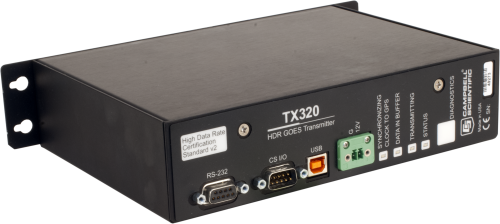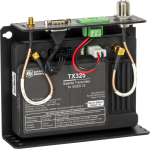This product is not available for new orders.

| Services Available | |
|---|---|
| Repair | No |
| Calibration | No |
| Free Support | No |
Overview
Campbell Scientific’s TX320 is a high data rate (HDR) transmitter that provides communications, via GOES satellites, from a Data Collection Platform (DCP) to a receiving station. It is compatible with most Campbell Scientific dataloggers and offers a convenient telemetry option for remote DCPs in the Western Hemisphere.
Read MoreBenefits and Features
- Transmission rates of 300 and 1200 bps
- Transmitter certified as High Data Rate version 2 compliant
- NESDIS-certified transmitter
- Automatic GPS correction of clock and oscillator drift
- Very stable clock that provides up to 28 days of operation between GPS fixes for more reliable operation in areas with poor GPS reception
- Diagnostics and status information can be sampled by the data logger and transmitted as part of the data stream
- Readily added or retrofitted to existing Campbell Scientific systems
- Non-volatile setups configured with Windows-based software
- USB port for connecting PCs to setup and perform diagnostics
- Independent self-timed and random data buffers
Images






Similar Products
Detailed Description
The TX320 supports data transmission rates of 300 and 1200 bps. Because clock accuracy is critically important for GOES satellite telemetry, the TX320 includes a robust, temperature-compensated-oscillator (TCXO) based clock and a GPS receiver. The real-time clock's precision allows independent operation for up to 28 days without GPS correction.
GOES System
GOES satellites have orbits that coincide with the Earth’s rotation, allowing each satellite to remain above a specific region. GOES satellites cover the western hemisphere.
The GOES system is administered by the National Environmental Satellite Data Information Service (NESDIS). NESDIS assigns addresses, uplink channels, and self-timed/random transmit time windows. Self-timed windows allow data transmission only during a predetermined time frame. Random windows are for applications of a critical nature (e.g., flood reporting) and allow transmission immediately after a threshold has been exceeded.
Data Collection Platform (DCP) Equipment
- TX320 GOES satellite transmitter (includes an SC12 cable)
- 17992 GPS antenna and the 18017-L cable. The GPS antenna mounts to the end of a crossarm via the 7623 ¾-in. threaded pipe and a 1049 NU-RAIL fitting or CM220 Mount.
- Data logger
- 25316 11-dBi Right-Hand Circular Polarized (RHCP) Yagi antenna with mounting hardware.
- COAXNTN-L RG8 antenna cable
- ENC16/18 or larger enclosure
- Power supply consisting of Campbell Scientific’s BP12 12-Ahr, BP24 24-Ahr, or BP84 84-Ahr battery pack, CH200 or CH150 regulator, and SP10 10-W or SP20 20-W solar panel
- 31320 Surge Protection Kit (optional)
Retrieving Data from the Ground Receiving Station
Choose one of the following methods:
- Internet (see NESDIS for requirements)
- Domsat
- LRGS
- DRGS (Direct Readout Ground Station)
Compatibility
Please note: The following shows notable compatibility information. It is not a comprehensive list of all compatible products.
Dataloggers
| Product | Compatible | Note |
|---|---|---|
| 21X (retired) | ||
| CR10 (retired) | The CR10 requires a special PROM. | |
| CR1000 (retired) | ||
| CR10X (retired) | For a mixed-array CR10X, use OS version 1, revision 15 through 19. For CR10X-PB, use the most current operating system; the RAWS-7 format is not supported by the CR10X-PB. | |
| CR200 (retired) | ||
| CR200X (retired) | ||
| CR205 (retired) | ||
| CR206 (retired) | ||
| CR206X (retired) | ||
| CR210 (retired) | ||
| CR211 (retired) | ||
| CR211X (retired) | ||
| CR215 (retired) | ||
| CR216 (retired) | ||
| CR216X (retired) | ||
| CR23X (retired) | ||
| CR295 (retired) | ||
| CR295X (retired) | ||
| CR3000 (retired) | ||
| CR500 (retired) | ||
| CR5000 (retired) | ||
| CR510 (retired) | ||
| CR6 | ||
| CR800 (retired) | ||
| CR850 (retired) | ||
| CR9000 (retired) | ||
| CR9000X (retired) |
Additional Compatibility Information
Environmental Enclosure
The TX320 transmitter needs to be housed in an ENC16/18, ENC24/30, or ENC24/30S environmental enclosure. You can order the enclosure with the 19332 and 19336 Antenna Cable/Bulkhead accessories that will allow the Yagi and GPS antennas to be connected without opening the enclosure door.
Power Supply
Typical power supply is a BP12 12 Ahr or BP24 24 Ahr battery, CH150 or CH200 regulator, and an SP10 or SP20 solar panel. The BP85 or a user-supplied deep-cycle rechargeable battery should be used when it is difficult to replace the batteries or the system's power requirements are large. The deep-cycle rechargeable battery should have at least a 60 Ahr capacity, and be trickle-charged with an 20 W solar panel.
GOES System Authorization Procedure
Non-U. S. government agencies and research organizations must have a sponsor from a U.S. government agency. Prospective GOES users must receive formal permission from NESDIS, by doing the following:
- Fill out the System Use Agreement (SUA) application form, which is available at http://noaasis.noaa.gov/DCS/htmfiles/appnewsua.html
The form can be submitted online or sent to:
GOES DCS SUA Processing Unit NOAA,
Satellite Services Division
4231 Suitland Road, Rm 1646
Suitland Federal Center Suitland, MD 20746
Tel: 301-817-4563
Fax: 301-817-4569
Email: Letecia.Reeves@noaa.gov - Following approval, NESDIS sends a Memorandum of Agreement (MOA). The MOA must be signed and returned to NESDIS.
- After the MOA is approved, NESDIS will issue a channel assignment and an ID address code.
- NESDIS must be contacted to coordinate a start-up date.
Specifications
- Operating Voltage Range: 10.8 to 16 Vdc
- Transmission Data Rates: 300 and 1200 bps
- Frequency Range: 401.7 MHz to 402.1 MHz
- Height: 15.8 cm (6.2 in.)
- Length: 24.9 cm (9.8 in.)
- Width: 5.3 cm (2.1 in.)
- Weight: 1.02 kg (2.25 lb)
Supply Current @ 12 Vdc
- Idle or Sleep: 5 mA
- During GPS Fix: < 70 mA for 15 minutes per day
- Transmission: 2.6 A
Channel Bandwidth
- 300 bps Transmission Rate: 750 Hz
- 1200 bps Transmission Rate: 2250 Hz
USB Port
- Connector: USB type B
- Command Protocols: ASCII Command Protocol
CS I/O Port
- Signal Levels: TTL
- Interface Protocol: Campbell Scientific Synchronous Device Communication (SDC)
- Command Protocol: ASCII Command Protocol1 or Binary Command Protocol2
RS-232 Port
- Signal Levels: RS232C
- Connector: DB9F
- Command Protocol: ASCII Command Protocol1 or Binary Command Protocol2
Output Power
- Complies with NOAA/NESDIS, GOES DCPRS Certification Standards
at 300 bps and 1200 bps, version 2.0 - For a 1200 bps link: DCPRS shall operate with an EIRP of 43 to 47 dBmi, assuming appropriate antenna
- For a 300 bps link: When transmitting to the GOES-13 or later satellites, the DCPRS shall operate with an effective EIRP of 37 to 41 dBmi, assuming appropriate antenna
- Example output power: 11.2 W @ 1200 bps transmission rate
Timekeeping
- Setting Accuracy: ±100 µs synchronized to GPS
- Drift: ±10 ms/day over -40° to 60°C
- GPS Schedule: 1 fix at power up, 1 fix per day afterwards
- Transmission Continuation w/o GPS Fix: 28 days
Frequency Stability
- Initial Accuracy: ±20 Hz disciplined to GPS
- Short-Term Drift: ±0.04 Hz/seconds
- Aging: ±0.1 PPM/year
- Vcc + Temperature: ±0.1 PPM
Temperature Range
- Operating: -40° to 60°C
- Storage: -55° to 70°C
1 - ASCII command protocol is described in “G5 ASCII Command Protocol (Document number 700-G5-CMND-ASCII)."
2 - Binary packet protocol is described in “G5 Binary Command Protocol (Document number 700-G5-CMND-BIN)."
Documents
Product Brochures
Manuals
Downloads
TX321 / TX320 GPS Update v.4 (1.09 MB) 18-12-2019
This download is a zip file that contains new firmware v11.11 and v10.23 for the G6 radio internal to the TX321 and v8.04 for the G5 radio internal to the TX320.
The file also contains the software package that uploads the new firmware and the TX321 / TX320 firmware update procedure.
